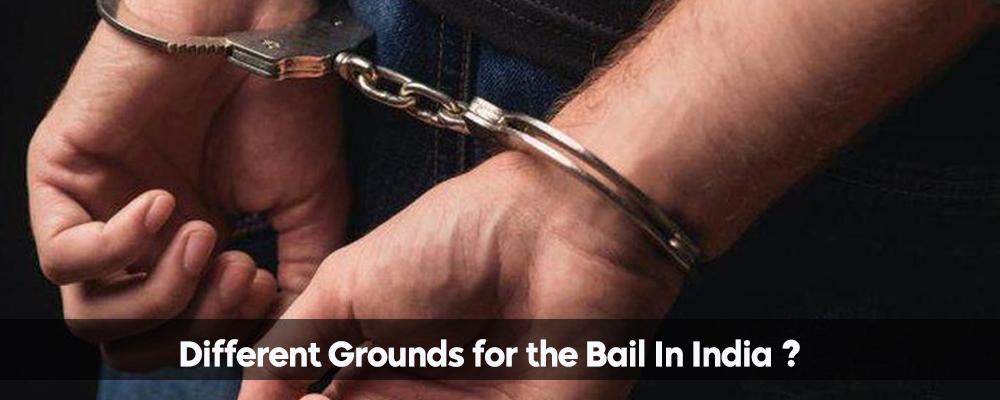In India, a person can get bail on various grounds depending on the circumstances of the case. Some of the common grounds for granting bail are:
Anticipatory Bail
A person can seek anticipatory bail when he/she anticipates arrest in a non-bailable offence. Anticipatory bail is granted by a court that allows the person to be released on bail in case of arrest.
Regular Bail
A person can seek regular bail when he/she has been arrested and is in police custody. Regular bail is granted by the court, and it can be either a surety bail or a personal bond.
Need A Legal Advice
The internet is not a lawyer and neither are you. Talk to a real lawyer about your legal issue

Medical Grounds
If a person is suffering from an illness that requires specialised medical treatment that is not available in jail, the court may grant bail on medical grounds.
Lack of Evidence
If the prosecution fails to provide sufficient evidence to establish the guilt of the accused, the court may grant bail.
Delayed Trial
If the trial is delayed, and the accused has been in custody for a long time, the court may grant bail.
Parity
If one of the co-accused has been granted bail, the court may grant bail to the other co-accused on the ground of parity.
Juvenile or Old Age
If the accused is a juvenile or an elderly person, the court may grant bail on the grounds of their age.
It is important to note that the grant of bail is always subject to the discretion of the court and is dependent on the facts and circumstances of the case.
In India, bail can be rejected by a court on various grounds depending on the circumstances of the case. Some of the common grounds for rejection of bail are as mentioned here.
Grounds for Rejection of Bail
Gravity of the Offence
If the offense is of a serious nature, such as murder, rape, or terrorism, the court may reject bail as the accused may pose a threat to society or is likely to tamper with evidence.
Likelihood of the Accused Fleeing
If the court believes that the accused is likely to flee the country or evade trial, the court may reject bail.
Previous Criminal Record
If the accused has a history of criminal activity or has been previously convicted of a crime, the court may reject bail.
Threat to Witnesses
If the accused poses a threat to the witnesses or is likely to tamper with evidence, the court may reject bail.
Non-cooperation with Investigation
If the accused is not cooperating with the investigation or is likely to destroy evidence, the court may reject bail.
Public Interest
If the grant of bail is against the public interest, the court may reject bail.
Pending Trial
If the accused is already out on bail in another case and has committed a similar offence, the court may reject bail.
It is important to note that the rejection of bail is always subject to the discretion of the court and is dependent on the facts and circumstances of the case.
In India, bail is not granted to a person accused of certain offences, known as non-bailable offences. The offences for which bail is not granted are mentioned below.
Non-Bailable offences
Offences punishable with death or life imprisonment
Bail is not granted to a person accused of an offence that is punishable with death or imprisonment for life.
Offences under certain Acts
Bail is not granted to a person accused of an offence under certain Acts, such as the Narcotic Drugs and Psychotropic Substances Act, Prevention of Corruption Act, and the Unlawful Activities Prevention Act.
Repeat Offenders
Bail may not be granted to a person who has been previously convicted of a similar offence, or has been out on bail in another case and has committed a similar offence.
Offenses against Women
Bail may not be granted to a person accused of an offense against women, such as rape, molestation, or domestic violence.
Economic Offences
Bail may not be granted to a person accused of an economic offence, such as fraud, embezzlement, or money laundering.
Offences affecting the Sovereignty of the Country
Bail may not be granted to a person accused of an offence that affects the sovereignty of the country, such as terrorism, sedition, or waging war against the nation.
It is important to note that the list of non-bailable offences is not exhaustive, and the court has the discretion to deny bail based on the facts and circumstances of the case.
The team of Lead India have the Best of the Criminal Lawyers In Delhi, Best of Criminal Lawyers in other cities of India who will help you to get your issue resolved you can connect to lawyers through our website LeadIndia, where you can ask the free questions, take expert legal advice or hire best lawyers in you city to get you issue resolved.





 Talk to a Lawyer
Talk to a Lawyer